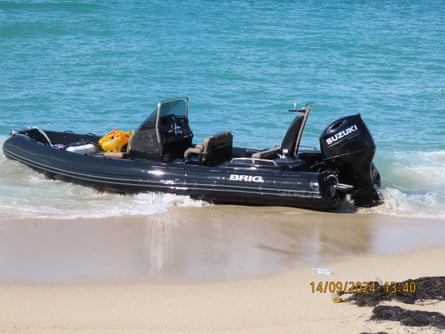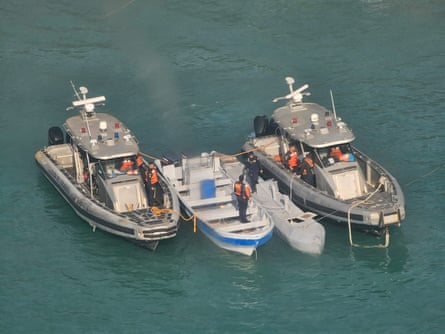Law enforcement agencies have urged people living in coastal communities in the UK to help them catch drug gangs that are using ever more imaginative methods to get vast quantities of cocaine into Britain.
They have warned that gangs are favouring a method called “at-sea drop-offs” (Asdos) in which packages of drugs are released into the ocean from “mother ships” for smaller vessels to pick up and take into the UK via small coves and harbours.
But there is also growing concern the gangs may begin to use more sophisticated techniques such as deploying underwater drones, nicknamed narco submarines, to evade Border Force cutters.
The appeal and warnings come as members of a gang involved in an attempt to smuggle £18m of cocaine into the UK using the Asdo method were sentenced at Truro crown court in Cornwall for conspiracy to import class A drugs.
The gang included a Hampshire fisher who had fallen on hard times, three Essex men believed to have been aiming to sell the drugs in the south-east of England, and a Colombian man thought to have been acting as security for the South American drug cartel.
Three of the men were caught after their boat was chased for almost 30 miles by Border Force officers, while the other four were arrested after an investigation by the National Crime Agency (NCA) into the wider network.
Charlie Eastaugh, the director of Border Force maritime command, said Asdos appeared to be the preferred method of drug smugglers. “It’s a persistent and continuing threat,” he said.
Last year, law enforcement agencies in the UK prevented almost 6.5 tonnes of cocaine, with a street value of £520m, from reaching the streets via Asdos. But much more is clearly getting in. It is estimated that people in England, Wales and Scotland consume 117 tonnes of cocaine a year.
Eastaugh said Border Force maritime had more than two dozen vessels patrolling, ranging from cutters to rigid-hull inflatable boats and jetskis, and worked with police forces as well as military special forces. “We have crews out for up to two weeks at one time patrolling around UK territorial waters,” he said.
But the jagged nature of the coastline in south-west England means there are myriad spots for smugglers to land undetected.
Eastaugh said good relations were being created between agencies and coastal communities through an initiative called Project Kraken.
“Coastal communities and the maritime commercial industry are really key parties in the fight against organised criminality at sea and smuggling. They can help contribute by being the eyes and ears of Border Force Maritime around the UK coastline.”
He said the drug importers would innovate. “We would expect, as we would with any type of criminality, that the wheel will turn and there will be a threat from other modes in the future.
“Something we have seen elsewhere in the world is underwater remotely piloted smuggling attempts – essentially subsea drones. It continues, as with every threat, to be plausible. A more modernised version of smuggling is something we’re on the lookout for.”
Adam Thompson, the head of drugs threat at the NCA, said the Asdos tended to take place in the south-west approaches off Cornwall but had also been observed in the Irish Sea and North Sea.
“They throw them into the sea wrapped up in waterproof packaging and buoyancy aids. And then a smaller vessel will come out and fish those out and take them to land. That’s the methodology that we’re seeing used most frequently over the last two years.”
He said changes to the way borders are managed during Covid and after Brexit may have prompted the rise of Asdos. “We’ve seen a trend for larger loads being put on to these vessels in South America. This is a very good way to offload very significant loads – tonnes at a time typically. You can throw it into the sea, bring it into a little beach. You don’t even need a marina.”
Thompson said 34 people involved in Asdos had been arrested last year and more than 60 investigations into the method had taken place.
He said: “We’ve got very good partnerships with Border Force and with maritime agencies around the world. This method relies on container ships coming over from South America on commercial routes.
“We look to understand which ones may have been contaminated with cocaine and focus on those routes which we know are being used.”
Sentencing four of the men, Judge James Adkin said: “This was an international conspiracy to smuggle a large quantity of cocaine into the UK.”
Scott Johnston, 38, of Havant in Hampshire was jailed for 24 years; Michael May, 47, of Brentwood, Essex for 19 years; Terry Willis, 44, of Chelmsford, Essex for 21 years; and Edwin Yahir Tabora Baca, 33, of Barcelona for 17 years and seven months.
Three others – Bobbie Pearce, 29, of Brentwood in Essex; Alex Fowlie, 35, of Chichester in West Sussex; and Peter Williams, 44, of Havant in Hampshire – are to be sentenced later this month.











